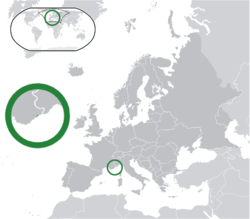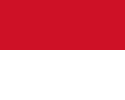Monaco
Monaco, officially the Principality of Monaco (French: Principauté de Monaco), is the second smallest country in the world after the Vatican City. Monaco is a city-state, meaning that the entire country is just one city.
Principality of Monaco | |
|---|---|
| Motto: "Deo Juvante" (Latin) (English: "With God's Help") | |
| Anthem: Hymne Monégasque (English: "Hymn of Monaco") | |
 Location of Monaco (green) on the European continent (green & dark grey) | |
| Capital | Monaco (city-state) 43°44′N 7°25′E / 43.733°N 7.417°E |
| Largest quarter | Monte Carlo |
| Official languages | French[1] |
| Other languages |
|
| Ethnic groups | |
| Demonym(s) |
|
| Government | Unitary parliamentary semi-constitutional monarchy |
| Prince Albert II | |
| Didier Guillaume | |
| Area | |
• Total | 2.08 km2 (0.80 sq mi) |
| GDP (PPP) | 2015 estimate |
• Total | $7.672 billion |
| Currency | Euro (€) (EUR) |
| ISO 3166 code | MC |
Monaco is located south-east of France, on the Mediterranean Sea in Western Europe. Monaco's official language is French while the language of Monégasque is also a national language. Monaco's population is around 38,000 but under 10,000 of its citizens are Monégasque nationals.
The currency is the Euro, even though Monaco is not part of the European Union. Monaco is considered a tax haven and is often regarded as one of the wealthiest countries in the world because many rich people live there.
Monaco is famous for the Monte Carlo Casino and the Monte Carlo Opera, is in the north-east of the country. Monaco is also famous for two car races: the Monte Carlo Rally and the Monaco Grand Prix.
History
changeMonaco began as a city named Monoikos and was under the control of the Holy Roman Empire, which later gave it to the Republic of Genoa.[2]
In 1297, Francesco Grimaldi and his army captured the fortress on the Rock of Monaco, but they were evicted by the Geonoese army. However, the Grimaldi family continued to fight for Monaco over the next century.[3] Rainier I was the first Grimaldi ruler of Monaco.
The Republic of Genoa eventually lost Monaco while fighting the Crown of Aragon. In 1419, the Grimaldi family purchased Monaco from Aragon. In 1642, Honoré II, gave himself the title "Prince of Monaco".[4] Until then, the rulers of Monaco were called the "Lords of Monaco".
In 1793, Monaco was invaded by France.[5] In 1814, the principality became independent again. However, a year later, the Congress of Vienna designated Monaco as a protectorate of the Kingdom of Sardinia. In 1860, Monaco became a French protectorate once again.
At the time, the towns of Menton and Roquebrune-Cap-Martin were part of Monaco. However, the citizens of these towns wanted to be part of France. Charles III gave the towns to France in exchange for Monaco's full independence.[6] A treaty was signed in 1861 which said that France would protect Monaco in case of a war.
In the early 1900s, Monaco became very popular among wealthy people because of the Monte Carlo casino. In 1910, there was a revolution in Monaco because the people wanted a democracy.[7] Because of this, the powers of the Prince of Monaco were reduced. During World War II, Monaco was occupied by Italy.
Prince Rainier III famously married American actress Grace Kelly, who died in a car crash. In 2005, Albert II became the new Prince of Monaco.
Geography
changeMonaco is entirely an urban area, meaning that it is all one city. There is only one natural resource in Monaco, which is fishing. The climate is a Mediterranean climate. There are land reclamation projects ongoing.
Its surface area is 2.02 square kilometres, of which approximately 0.4 were recovered from the sea since 1980.
Politics
changeMonaco is a constitutional monarchy, meaning that the head of state is a monarch with little to no say in the way the country is governed. Monaco is a principality, which is a type of monarchy where the monarch holds the title of Sovereign Prince.[8]
The constitution of Monaco designates three councils to run the country. The three councils are:
- The National Council, which is the legislature. It consists of 24 elected members, who may be members of political parties. The National Council meets twice a year to discuss bills put forward by the Prince's government. The council is presided over by a president.
- The Council of Government, which is the executive branch. The Government consists of 6 members, one of which is the Minister of State, who is appointed by the Sovereign Prince.[9]
- The Communal Council is the city council. It consists of 15 elected members, one of which is the mayor. The Communal Council is in charge of the social and cultural aspects of the country.
In addition, Monaco is divided into ten administrative wards.
Monaco has no military and is protected by France. However, it does have a police force of around 515 members.
Economy
changeTourism is the main industry. Tourism is extremely popular during the Monaco Grand Prix. People in Monaco pay no income tax. Many rich people live in Monaco and it is known for being very wealthy. Another large industry is gambling due to the Monte Carlo Casino.
Culture
changeMonaco's culture is heavily influenced by its surrounding countries such as France and Italy. The main religion is Catholicism. The cuisine is influenced by that of northern Italy and southern France.
In terms of music, Monaco has an opera house, a symphony orchestra and a classical ballet company. Monaco has participated regularly in the Eurovision Song Contest, winning in 1971.
There are three museums in Monaco.
The Principality of Monaco hosts major international events such as :
Monaco also has an annual bread festival on 17 September every year.
Education
changeMonaco has ten state-operated schools, including: seven nursery and primary schools; one secondary school; one lycée that provides general and technological training and one lycée that provides vocational and hotel training.
There are also two grant-aided denominational private schools.
There is one university located in Monaco, namely the International University of Monaco (IUM).
References
change- ↑ "Constitution de la Principauté". Council of Government. Archived from the original on 22 July 2011. Retrieved 22 May 2008.
- ↑ "Monaco". State.gov. 16 November 2011. Archived from the original on 14 August 2021. Retrieved 28 May 2012.
- ↑ "Histoire de Monaco, famille Grimaldi | Monte-Carlo SBM". Fr.montecarlosbm.com. Archived from the original on 9 June 2012. Retrieved 28 May 2012.
- ↑ "Monaco – The Principality of Monaco". Monaco.me. Archived from the original on 21 July 2020. Retrieved 28 May 2012.
- ↑ "Important dates – Monaco Monte-Carlo". Monte-carlo.mc. Archived from the original on 1 May 2012. Retrieved 28 May 2012.
- ↑ "History of the Principality of Monaco – Access Properties Monaco – Real-estate Agency Monaco". Access Properties Monaco. Archived from the original on 9 August 2012. Retrieved 28 May 2012.
- ↑ "Monaco timeline". BBC News. 28 March 2012. Archived from the original on 27 May 2012. Retrieved 28 May 2012.
- ↑ "Monaco". State.gov. 16 November 2011. Archived from the original on 14 August 2021. Retrieved 22 March 2012.
- ↑ "Politics". Monaco-IQ. Archived from the original on 6 April 2012. Retrieved 28 May 2012.

